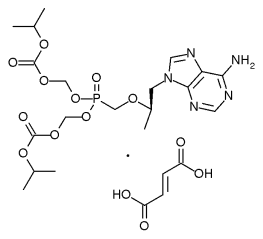The FDA has approved Viread (tenofovir disoproxil fumarate), a new antiviral drug for the treatment of HIV-1 infection in combination with other antiretroviral medicines.
The introduction of potent antiviral drugs and the combined used of these drugs, often called "cocktails," has markedly reduced replication of HIV in many infected people and has improved survival rates. But because HIV mutates rapidly, resistance to one or more of these potent drugs may develop over time, necessitating the development of new drugs to treat these resistant virus strains.
The FDA based its approval of Viread on two clinical studies involving more than 700 patients who had previously been treated with antiretroviral agents, but showed signs of continued HIV replication despite drug therapy.
There are no study results to show long-term inhibition of the clinical progression of HIV by Viread. In addition, the risk-benefit ratio for people who have never been treated with antiretrovirals is unknown since the studies only included people previously treated with the drugs.
Viread is available as a 300-milligram tablet to be taken orally, with a meal. Use of the drug should be considered for adult patients with HIV strains that are expected to respond to Viread as assessed by laboratory testing or treatment history.
The most frequently reported adverse events among patients in the clinical trials were mild to moderate gastrointestinal problems, including diarrhea, nausea, vomiting and gas. Severe liver enlargement and excess fat in the liver have also occurred among patients treated with drugs similar to Viread, alone or in combination with antiretrovirals. These are severe and potentially fatal conditions.
Viread is marketed by Gilead Sciences Inc. of Foster City, Calif.
COPYRIGHT 2002 U.S. Government Printing Office
COPYRIGHT 2004 Gale Group



